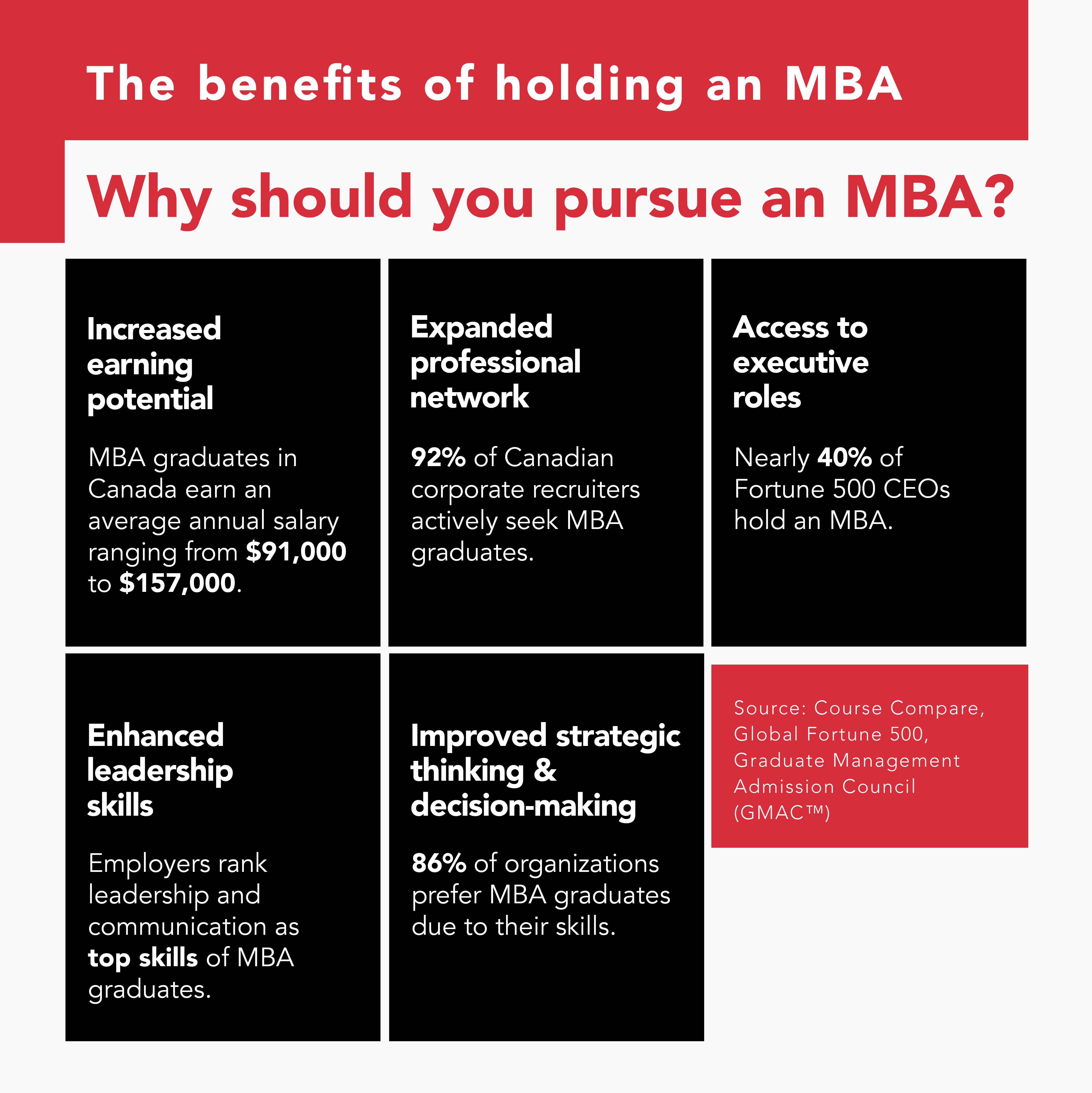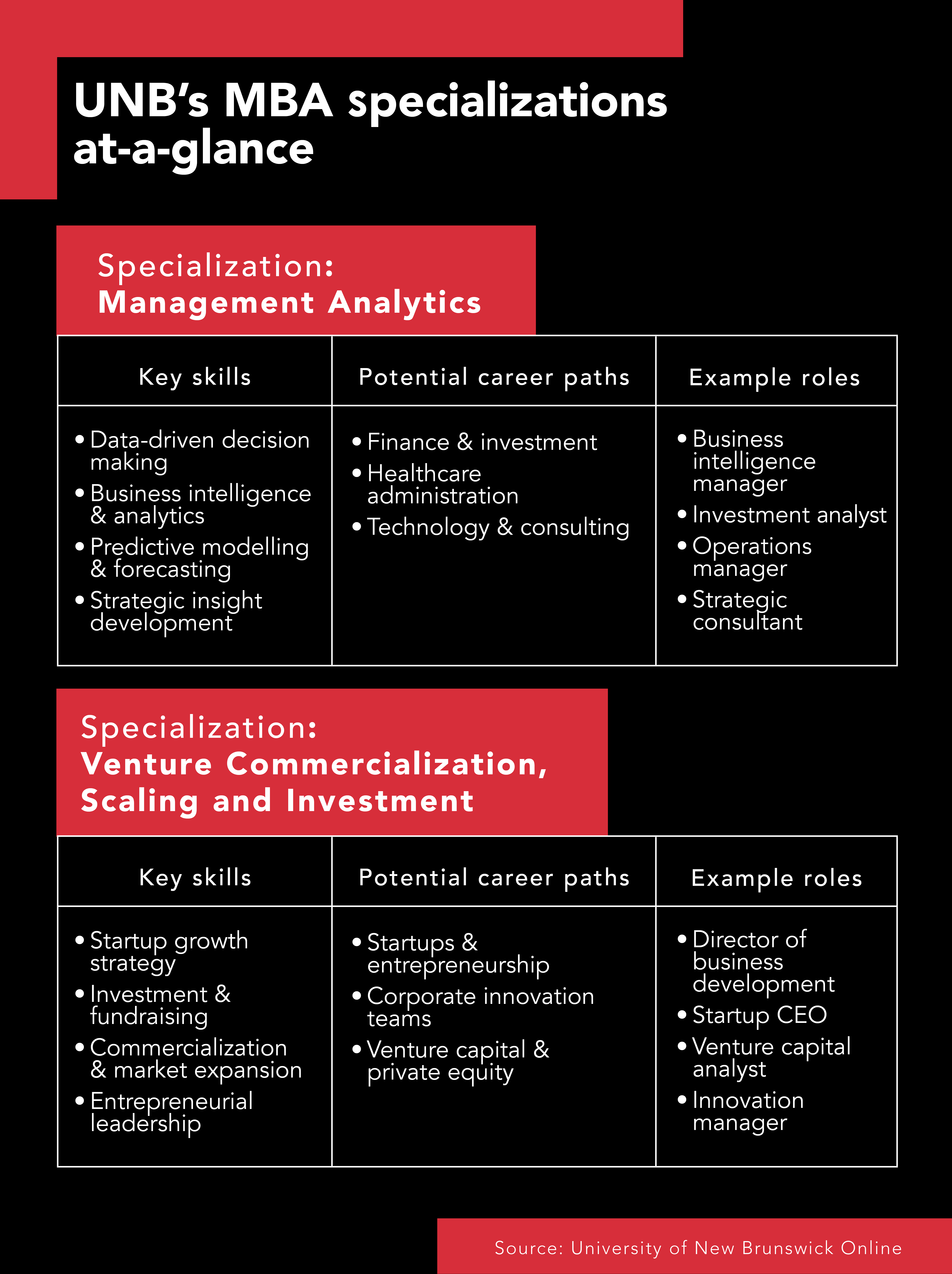A Master of Business Administration (MBA) is more than just a line on your resume or a framed certificate on the wall. It’s a strategic move that sets the stage for high-impact, high-level roles. It’s also a globally recognized credential that’s valued for developing leadership, critical thinking and data-driven decision-making skills that drive professional success.
MBA graduates often rise through the ranks of corporate environments, but their reach extends far beyond traditional boardrooms. They lead departments, manage global teams and use high-level data and leadership skills to drive innovation and growth across numerous industries.
Curious where an MBA can take you? Let’s dive into how this versatile degree opens doors across industries, from finance and tech to healthcare and content strategy.
Business administration and strategic career paths for MBA graduates
Roughly 85% of Canadian MBA graduates are employed within three months of graduating, as employers often value employees with a strong foundation in business strategy, operations and leadership. MBA holders are well-positioned to step into leadership roles that require decision-making at scale. This includes stepping into existing business roles or moving toward their own business endeavours.
It’s common to find them managing departments, optimizing supply chains and guiding organizational change. Roles such as operations manager, management consultant or director of business development are natural next steps.
These roles are especially appealing because they can open doors to executive-level opportunities. Many business professionals leverage their early leadership positions as stepping stones toward the C-suite. They learn how to build effective teams, drive performance and align operations with overarching business goals, which is necessary experience for any future executive.

From analyst to strategist: Becoming an investment analyst with an MBA
One of the most compelling outcomes for MBA students, especially those pursuing a management analytics specialization, is the ability to turn data into strategy. For aspiring investment analysts, this skill set is crucial.
In this role, you’ll dive into corporate finance, market research and financial forecasting, supporting investment decisions with sharp insights and evidence-based strategies. Investment analysts in Canada typically earn between $69,214 and $82,949 annually, depending on their experience and the size of the firm, according to Glassdoor.
MBA graduates stand out in investment firms, banks and corporate strategy teams due to their command of financial modelling, risk analysis and strategic planning. These skills not only sharpen decision-making but also demonstrate your value in high-stakes financial environments.
The road to chief financial officer (CFO): Leadership in finance
If your goals lean toward high-level financial leadership, the MBA degree offers a path toward the chief financial officer (CFO) role. CFOs aren’t just accountants; they’re strategic advisors who shape the financial direction of entire organizations.
Through your MBA program, you’ll develop expertise in capital planning, regulatory compliance and financial strategy, positioning yourself for key roles in controllership, treasury and financial planning and analysis (FP&A). A specialization in management analytics can add even more value to your profile, allowing you to analyze trends and optimize financial decisions in real time.
According to Glassdoor, CFOs in Canada earn an average annual salary between $160,354 and $226,291. This variance is often due to experience level and the structure of the business itself, with compensation often rising with company size and performance-based bonuses.
Leading the organization: How to become a chief executive officer (CEO)
The chief executive officer (CEO) role is one of strong leadership skills and impeccable vision. As the highest-ranking executive, the CEO sets the strategic direction, shapes company culture and ensures sustainable growth.
An MBA program doesn’t just prepare you for operational excellence; it trains you to think big. You’ll learn how to scale ventures, manage cross-functional teams and foster innovation across all levels of the business. These are the foundations of executive leadership.
Salaries for CEOs vary widely based on experience level and the size of the individual company but typically average between $136,394 and $221,475 in Canada. Significant bonuses or equity stakes can also affect salary potential, depending on the organization’s size and performance.
Specializing in venture commercialization, scaling and investment can give you a distinct advantage if your ambitions include leading a startup or scaling a growing company. Understanding how to attract investors, expand market reach and build scalable infrastructure will help you lead with purpose and power.
Human resources and organizational development: A growing career path
Today’s human resources (HR) leaders are expected to bring more than empathy and people skills. They’re also strategic thinkers who align talent with business goals. HR leadership offers a rewarding and impactful path for MBA graduates who are passionate about people and processes.
Roles such as HR managers, director of talent or VP of people and culture are increasingly filled by professionals with business acumen. According to Glassdoor, HR managers in Canada earn between $87,889 and $97,917, with more senior titles reaching even higher.
An MBA equips you with skills in organizational development, change management and communication strategy, all of which are important for navigating modern workplace challenges, from DEI initiatives to global workforce planning.
Hospital administration and executive healthcare roles with an MBA
Healthcare is one of the most dynamic and complex sectors in the modern economy. With an aging population and rising care demands, the need for business-minded healthcare leaders has never been greater.
MBA graduates are stepping into roles like hospital administrator, director of operations and healthcare strategist, overseeing everything from budgets and staffing to patient satisfaction and policy implementation.
According to Glassdoor, healthcare administrators in Canada earn between $52,317 and $76,633 a year, depending on experience and location. Graduates specializing in management analytics may be especially desirable in this industry as their analytical skills are highly sought after for these healthcare roles.
With a solid understanding of both clinical priorities and business principles, MBA graduates are uniquely positioned to improve outcomes. This applies not just to patients but to entire health networks. You become the bridge between quality care and operational excellence.
Content strategy and digital transformation: The new frontier for MBA graduates
Companies need leaders who translate branding and marketing goals into meaningful business outcomes. This is where MBA graduates make a significant impact.
Whether you step into a marketing director role, manage content strategy or lead digital transformation projects, your MBA gives you the tools to think analytically, communicate effectively and innovate with intent.
Data collected from Glassdoor shows that digital strategy managers in Canada earn between $85,198 and $94,552 a year, depending on experience and sector.
Combining business fundamentals with skills in UX, analytics and communications, MBA graduates are well-prepared to lead change across platforms. You’re not just creating content; you’re shaping how businesses connect with their audiences in meaningful, measurable ways.

Why MBA graduates are highly valued across all industries
A 2024 survey by the Graduate Management Admission Council (GMAC) found that 92% of corporate recruiters and 95% of staffing firms intend to hire MBA graduates within the year, with employers citing their strategic thinking, communication skills and leadership potential as key assets.
This shows that organizations value business professionals with the practical skills necessary to hold senior positions and lead cross-functional teams, regardless of industry. In this way, an MBA isn’t just a sign that you understand business; it’s proof that you can navigate change, make tough decisions and drive results.
It's also important to note that MBA graduates are often hired not just for what they know but for how they think. Employers are looking for critical thinkers who can analyze trends, build strategies and inspire teams. The ability of MBA holders to connect the dots between business goals, team dynamics and long-term growth often sets them apart in a competitive marketplace.
Ready to step into a C-suite role? Start your MBA journey with UNB Online
If you’re ready to turn ambition into action, the University of New Brunswick’s (UNB) Online MBA program can help you get there. Designed for working professionals, this flexible and growth-driven program supports your goals, whether that’s leading a startup, managing hospital systems or climbing the corporate ladder.
With specializations in management analytics and venture commercialization, scaling and investment, UNB gives you the skills and confidence to lead at the highest level. Get more program information or begin your application today to start your next big business move.

